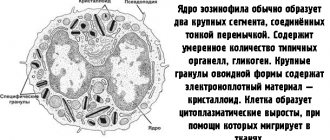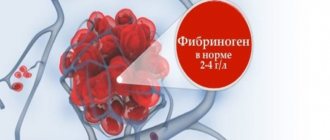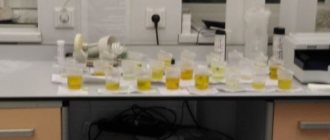Thyroid-stimulating hormone (TSH) is part of a group of glycoproteins synthesized by basophilic cells of the PDH (anterior pituitary gland). In the human body, TSH performs a vital function; it is the main regulator of the synthesis and release of thyroid hormones (T3-triiodothyronine and T4-thyroxine).
Secretion of thyroid-stimulating hormone occurs according to the principle of feedback from the level of thyroid hormones. If there is a low level of thyroid hormones in the blood, TSH secretion increases.
If TSH is below normal, the patient should undergo a thorough examination by an endocrinologist, since such changes in the tests indicate disturbances in the functioning of the hypothalamic-pituitary system and the thyroid gland.
What it is?
TSH is a thyroid-stimulating hormone (thyrotropin), synthesized by the pituitary gland in the brain and responsible for controlling the functioning of the endocrine system. But the effect affects the thyroid gland to a greater extent: TSH regulates the production of two other thyroid-type hormones: triiodothyronine (T3), thyroxine (T4).
TSH is designed to maintain hormonal balance: if the amounts of T4 and T3 increase, the pituitary gland receives a signal and begins to synthesize thyroid-stimulating hormone in smaller volumes to prevent additional stimulation of the thyroid gland.
TSH also performs other functions, for example, it participates in the production of nucleic acids, proteins, and phospholipids in the body. Therefore, if the level is pathologically low and persists for a long time, this affects the condition and health of the person.
What to do if thyrotropin levels drop after childbirth?
This happens quite often, because during pregnancy the female body experiences serious stress, providing all the necessary substances, including hormones, not only to itself, but also to the child, or even several, growing and developing inside her. And after childbirth, the load does not decrease, it just becomes a different kind of load - feeding the baby.
Not every woman who has recently given birth is able to understand that her thyrotropin levels are low. She may not even suspect that she has a disease such as postpartum thyroiditis, and she attributes her poor health to banal fatigue: how can she not get tired if she devotes the whole day to the child and household chores? In order not to miss the onset of the disease, a woman should know how this disease progresses and what symptoms are accompanied.
The first phase of postpartum thyroiditis lasts approximately three months. During this time, the woman sharply loses weight, although she is always hungry, swells (swelling extends not only to the limbs, but also to the eyelids), and suffers from tachycardia, which cannot be treated with conventional treatment. She is excitable, nervous, overly emotional. At this time, the thyroid gland cells are destroyed, and, under stress, it releases a large amount of hormones into the blood.
The second phase of the disease is hypothyroidism. A woman at this stage of postpartum thyroiditis feels weak, lethargic, and chronic fatigue. She gains weight, her skin and hair become dull. At this time, the thyroid gland does not fully cope with the production of hormones, and the body feels their deficiency.
Fortunately, in many cases, the third phase begins - eutheriosis, which is characterized by the fact that the thyroid gland overcomes the painful state and gradually returns to normal. The woman’s well-being is returning to normal, as postpartum thyroiditis gradually disappears.
It turns out that a woman doesn’t even always need special treatment? Why, then, should a woman who has recently given birth worry about low thyrotropin? The answer is simple: if postpartum thyroiditis always developed according to the described pattern, there would be no problems. Unfortunately, the disease may not proceed according to the classical version. More precisely there are two of them:
- Postpartum thyroiditis, bypassing the second phase (hypothyroidism), goes away - self-healing occurs;
- Postpartum thyroiditis, contrary to the classic version, does not go away, but, on the contrary, develops into damage to the thyroid gland. The result is a serious disease, which very quickly turns from an acute form into a chronic one.
Therefore, a woman who has recently given birth needs, despite being busy, to find time for herself: take the prescribed tests, visit an endocrinologist, monitor how thyroiditis develops, and respond in a timely manner to emerging symptoms.
Normal values for women
The norm of thyrotropin for females depends on age. In girls from five to fourteen years old it is 0.4-5 µIU/ml. In girls and women, the level ranges from 0.4 to 4 µIU/ml. This is the amount that is considered optimal if pregnancy is planned.
During gestation, global hormonal changes occur in the body of the expectant mother, affecting the functioning of the endocrine system. And a low TSH level is considered acceptable if it does not go beyond the limits. During pregnancy, good indicators are from 0.1 mIU/l to 3.5. The level depends on the timing: in the 1st trimester the decrease is most significant (from 0.1 to 0.4 mIU/l), then the amount gradually increases.
In multiple pregnancies, TSH levels may be even lower.
Possible complications
If low TSH is not properly treated, various complications can occur:
- Acute thyrotoxic crisis is a life-threatening condition that can affect various organs and systems.
- Stroke, atrial fibrillation, and atrial fibrillation leading to acute heart failure can occur in patients who already have symptoms of damage to the cardiovascular system.
- Visual impairment, from mild forms (double vision, a feeling of “sand” in the eyes) can progress to a sharp decrease in visual acuity up to blindness.
- Due to a violation of mineral metabolism, calcium deficiency appears in the body, which leads to its leaching from the bones. In this case, the bones become brittle and fractures can occur even with minor impact or trauma.
- Graves' dermopathy is characterized by swelling and redness of the skin in the extremities, especially the legs. Often combined with eye damage (Graves' ophthalmopathy).
- Deep mental disorders - depression, schizophrenia, acute psychosis.
Thus, a low TSH level in women may indicate initial or profound disturbances in the functioning of the neuro-endocrine system. Symptoms do not always correspond to the severity of laboratory abnormalities. Therefore, with any decrease, it is important to consult a doctor in a timely manner to find out the cause of the deviation and its correction.
Author: Natalya Kalegova
Reasons for the decline
If the TSH level is low, it means that the thyroid gland synthesizes the hormones T4 and T3 in significant quantities. And their increased production is observed in two cases. The first is hyperthyroidism, that is, hyperfunction of the thyroid gland, characterized by increased levels of thyroxine and triiodothyronine in the body.
The second case is thyrotoxicosis, which is a consequence of hyperthyroidism and develops with a persistent and prolonged increase in the synthesis of T3 and T4. Increased amounts of hormones provoke a toxic effect on the body, cause endocrine disorders and hormonal imbalances.
The video talks about the causes and symptoms of hypothyroidism, as well as a lack of thyroid hormones.
The causes of low TSH levels are various:
- Diffuse toxic goiter is a disease that is autoimmune in nature and is accompanied by increased synthesis of thyroid hormones produced by diffuse thyroid tissues.
- Plummer's disease. Another name is thyrotoxic adenoma; it is benign in nature and independently produces thyroid hormones.
- Malignant or benign neoplasms localized in the thyroid gland.
- Hashimoto's thyroiditis is of an autoimmune nature, especially in the hyperthyroid phase. When the disease occurs, the body produces large amounts of antibodies that attack the thyroid tissue.
- Long-term and uncontrolled use of certain drugs that increase the activity of the thyroid gland. These are iodine-containing agents, interferon, L-thyroxine.
- Excessively strict diets, starvation, exhaustion.
- Lesions or damage to the hypothalamus and pituitary gland, which are involved in the synthesis of TSH. A low level is possible after traumatic brain injury, infectious diseases of the brain, or with neoplasms located in the parts of the brain in question.
- Resection (removal) of the thyroid gland.
Why is low TSH dangerous: effects on the body and consequences?
If a decrease in thyroid-stimulating hormone is caused by pathology of the hypothalamus or hypothalamus, then this situation is not life-threatening. Unless the quality of life decreases and some discomfort appears.
If thyrotoxicosis has developed and there is an excess of thyroid hormones, then this state of affairs can be considered life-threatening, since these hormones begin to destroy tissues and the functioning of organs and systems.
The consequences of thyrotoxicosis can be:
- vegetative-vascular dystonia of the hypertensive type
- myocardial dystrophy
- panic attacks
- emotional lability
As you can see, low TSH can be detected not only in diseases of the pituitary gland or thyroid gland. In each case of detection of low TSH values, an individual approach and comparison of not only instrumental data, but also the complaints of the patient and the general clinic are required.
Did you like the article? Click on the social buttons. networks to share with friends. We will be grateful for your possible assistance in the development of the project.
How do you know if your TSH level is low?
Examination of the thyroid gland by a doctor.
There are the following signs of low TSH:
- increased irritability, emotional imbalance, nervous excitability;
- weight gain due to normal or increased appetite;
- tachycardia, increased blood pressure, increased heart rate;
- insomnia, shallow or interrupted sleep;
- increased sweating, feeling of heat in the body;
- deterioration of mental activity, attention and memory;
- weakness and chronic fatigue;
- disruptions in the digestive process (usually constipation);
- hearing impairment;
- decreased visual acuity.
The described symptoms can be vague or pronounced, appearing separately or simultaneously. The picture of low TSH depends on the specific causes of the pathology.
TSH is low: treatment
Treatment for low TSH levels depends on the cause of the condition. For central hypothyroidism and hyperthyroidism, treatment tactics are completely different. Therefore, you should not rely only on the thyrotropin level when choosing treatment.
Treatment of central hypothyroidism
For central hypothyroidism, therapy is replacement in nature. TSH is not injected into the body; substances whose synthesis is impaired due to TSH deficiency, that is, thyroid hormones, are prescribed.
With central hypothyroidism, thyroid hormones must be taken every day, often for life.
The drug Levothyroxine, free T4, is used for treatment. The dosage is determined individually and depends on several factors - gender, weight, age, and the presence of concomitant pathology.
Women under 50 years of age are prescribed 1.6–1.8 mcg/kg. On average, this is 75–100 mcg per day.
In old age, smaller dosages are used, as the risk of complications from the cardiovascular system increases. Usually 0.9 mcg/kg is prescribed.
In the presence of cardiac pathology, the initial dose is 25 mcg per day. If well tolerated, the dosage is increased.
During pregnancy, the need for T4 increases, so the dose of Levothyroxine is increased.
When taking Levothyroxine, you need to monitor the level of T4 in the blood. T4 concentration is maintained at a level that corresponds to the upper third of normal values. In the treatment of central hypothyroidism, changes in TSH concentration are not indicative.
Taking Levothyroxine helps compensate for thyroid deficiency
Treatment of hyperthyroidism
Treatment of hyperthyroidism depends on the specific pathology. In most cases, thyreostatic drugs are used that suppress the secretory activity of the thyroid gland.
The main thyreostatic drug is Mercazolil (Thiamazol), which inhibits the production of thyroid hormones. Thyrostatic treatment is effective, but not always safe for the human body. Dangerous side effects may develop:
- from the bone marrow – agranulocytosis, leukopenia, aplastic anemia;
- liver damage;
- allergic reactions;
- joint pain.
Less commonly, radioactive iodine or surgery is used for treatment.
For subacute and acute thyroiditis, during the period of hormone release from cells into the blood, specific treatment is not used. It makes no sense to prescribe thyreostatic drugs. In the future, for autoimmune thyroiditis, glucocorticosteroids are prescribed, and for acute thyroiditis, antibacterial agents are prescribed.
If the TSH hormone is elevated: causes and symptoms
Another possible pathology is an increase in the amount of TSH synthesized, but this is less common than a low level. The causes are usually pathologies of the thyroid gland, pituitary gland or hypothalamus: trauma, infectious lesions, inflammatory processes, neoplasms. Also, increased rates can be observed after cholecystectomy (removal of the gallbladder), severe poisoning (metals, iodine), and radiation.
Signs of high TSH are:
- apathy, lack of interest in life, depression;
- constant drowsiness, severe fatigue;
- low heart rate, low blood pressure;
- loss of appetite;
- problems with conception and menstrual cycle disruptions in women;
- lethargy, slow reaction;
- causeless weight gain;
- changes in stool;
- peeling, dry skin;
- swelling of the limbs and face.
Features of the hormone
Thyroid-stimulating hormone is very important for the functioning of the entire body and has the following effects:
- Regulates the functioning of the thyroid gland;
- Responsible for the production of gland hormones;
- Takes part in metabolism;
- In the proper growth and development of the whole organism; You can view the weight and height chart here.
- In the work of the heart, blood vessels, digestive organs.
TSH is produced by the pituitary gland. This gland is located in the brain. Supervises the work of the pituitary gland, the hypothalamus, which is directly related to the work of the central nervous system and the endocrine system.
As soon as the hypothalamus senses that the thyroid gland has decreased or increased the production of hormones, a signal is sent to the pituitary gland, and it increases the level of TSH in the blood. A low rate is less common than a high rate. We present to your attention another article about the thyroid gland, symptoms of the disease in men.
Finding out your TSH level or how to get tested correctly
A blood test will help determine if your TSH level is low. For reliable results, you need to take it correctly. To prepare, a day or two before your visit to the laboratory or medical facility, avoid eating fatty and heavy foods, intense exercise, smoking and drinking alcohol. Avoid stress and overheating.
Blood test for thyroid-stimulating hormone.
Blood is drawn on an empty stomach, so do not eat breakfast. Dinner should be light, and it is advisable to eat at least 8-11 hours before the test. The optimal time for collecting biomaterial is between 8 and 11 am. But before manipulation, it is advisable to calm down and relax, as stress can distort the results.
The diagnosis also takes into account the amount of hormones T4 and T3, which indicates certain pathologies.
About diet and nutrition
To achieve a positive result, taking traditional medications and traditional medicine is not enough. It is necessary for a person to eat properly. The diet is not very strict, so sticking to it is not so difficult. You should eat the following foods:
eat more fish, just choose fatty varieties. With its help, the hormonal balance in the body is quickly restored, and the functioning of the thyroid gland is stabilized. Such products are useful for all people, but you should not eat fatty fish more than 4 times a week; In this state, the human body is severely lacking fatty acids, so you need to consume coconut oil.
Ideally, such foods should be eaten 4 times a week, once a day is enough, in small portions; It’s good to drink goat’s milk, it’s also good to eat foods made from it that lower hormonal levels; in this state, it is important to stabilize the blood sugar level; for this, consume more flaxseeds, which can simply be added to food; The drinking regime is of great importance; you should prefer plain water without gas; you should drink at least 3 liters of it per day.
You can simply drink it; various first courses are also prepared with it; Without vegetables and fruits, a diet cannot be complete; it contains all the vitamins that are necessary for the normal functioning of the human body.
Special attention should be paid to those foods that should be avoided:
some raw vegetables (there are only 4 of them), since radishes, radishes, turnips and cabbage should not be consumed in this state; You cannot drink tap water - it contains large amounts of chlorine and fluoride
This applies not only to people with this disease, but also to everyone else; if a person has hypersensitivity to gluten, then you should not consume products made from pasteurized cow’s milk; it is important to control your consumption of sweets and sugar; no need to eat refined foods...
With proper nutrition, hormonal levels are maintained at normal levels.
If you stick to such a diet, you can quickly get rid of excess weight, your health generally improves, and your thyroid function returns to normal. With the help of proper nutrition, hormonal levels are maintained at normal levels.
If a person has low TSH, then his diet must include the following foods:
- mix rowan and feijoa, then add sugar. Half an hour before each meal, you should take a teaspoon of this tasty and healthy remedy;
- make a decoction of kelp leaves and drink a small spoon every evening before going to bed. This decoction has a tart taste, so you can drink it with water; this should last for at least a month;
- make a decoction of nettle and cocklebur; after it has cooled, add 80 drops of nut tincture. This mixture is taken 2-3 times a day, 100 grams each time.
How to normalize TSH levels
If the TSH level is low, actions aimed at normalizing it will depend on what triggered the deviation. Directions of therapy may be as follows:
- With increased production of T4 and T3 against the background of low TSH, drugs are prescribed that suppress hormone synthesis and reduce thyroid function.
- A healthy lifestyle is important: no stress and overwork, moderate activity, a balanced diet without fasting or strict diets.
- Neoplasms present against the background of low TSH are subject to surgical removal.
- After removal of the thyroid gland, the doctor prescribes hormone replacement therapy - taking synthetic analogues of thyroxine.
Symptoms
A persistent decrease in thyrotropin levels is indicated by a complex of negative signs:
- increased appetite, satiety does not last long even after a hearty breakfast or lunch;
- bowel dysfunction (diarrhea) occurs;
- migraine-like headaches;
- a woman often feels trembling in her body, the patient shudders in the absence of a high temperature;
- emotions often get out of control, increased irritability or indifference, lethargy occurs;
- body temperature is below optimal levels.
Threats
If TSH is low, it is dangerous for the body, especially when planning pregnancy and after it occurs. This is fraught with early miscarriages and premature birth, delays in fetal development, congenital anomalies in the child, impaired blood supply to the placenta and its detachments, hypoxia (lack of oxygen). To avoid negative consequences with low TSH, a woman dreaming of a child should normalize the level and only then continue planning.
Interesting video about the thyroid gland, hormones and pregnancy.
The causes of low TSH vary, and only a doctor can determine them. You must notice the symptoms and immediately see a specialist in order to normalize the level in a timely manner and avoid trouble.
(voted: 1, rating: 5.00 out of 5)
Share the news on social networks
Ask a Question! You have questions? Feel free to ask any questions! And our staff specialist will help you. Go>>
- Recommended Articles
- Retroflexion of the uterus
- Therapeutic tampons to improve women's health
- Free fluid in the pelvis in women
« Previous entry
If the disease affects older women
As already noted, older women are often exposed to thyroid diseases. Hypothyroidism in women of this age category develops 6 times more often than in younger representatives of the fair sex.
Often the disease takes on an advanced form, since the clinical signs are unclear, many confuse them with diseases of old age, therefore seeing no reason to be treated. If an elderly woman experiences the following symptoms, there is a high probability of developing hormonal disorders:
- cognitive function is impaired;
- social behavior is inappropriate;
- mental disorders begin;
- frequent depression.
With such signs, seeking medical help should be timely, then it is possible to prevent negative consequences
Thyroid-stimulating hormone is not something to joke about at any age, but older people should pay special attention to its condition. Any deviation from the norm should be a reason to consult a doctor
What causes thrush?
Discussion: 4 comments
- Alexander:
12/04/2018 at 00:19Good evening. Tell me, my TSH hormone is 2 times too low, while T3 and T4 are normal. What could it be.
Answer
Yakov:
12/06/2018 at 20:52
Good evening, Alexander! There can be many factors why your TSH is low, for example: stressful situations, exhaustion of the body, or long-term use of medications that reduce TSH levels. You should start eating a balanced diet and exercising if you haven't already.
Answer
12/17/2018 at 09:32
Good afternoon, my TSH is 0.003 mU/l, tell me which doctor should I see? and what exactly should you pay attention to?
Answer
- Yakov:
12/19/2018 at 19:35
Good afternoon, your hormone level is low. You need to see an endocrinologist as soon as possible. You should be prescribed medications, and special attention should be paid to a healthy diet and lifestyle.
Answer
Symptoms of decline
Low TSH. Symptoms in women are very diverse due to the comprehensive influence of T3 and T4 on the functioning of the entire body. With a decrease or absence of TSH, there is no clear correspondence between the deviation of laboratory parameters and the clinical condition of the patient.
For example, even in the absence of TSH during analysis, the patient may not have any complaints. Conversely, with a mild degree of hormone reduction, there are many symptoms indicating hyperthyroidism.
Usually, when low TSH is detected in the blood, an increased amount of T3 and T4 is determined, that is, hyperthyroidism is present.
Increased production of thyroid hormones has the following symptoms:
- General symptoms are weakness, fatigue, tiredness, headache, sweating, increased body temperature to 37-37.5, loss of body weight with increased appetite due to accelerated metabolism.
- Redness and swelling of the eyes appear quite early. In later stages, this can develop into visual impairment, photophobia, and exophthalmos—a persistent protrusion of the eyeballs caused by the growth of fatty tissue behind them.
- The heart rhythm is abnormal, often there is tachycardia or pain in the heart.
- Breathing may be difficult due to an enlarged thyroid gland and compression of the trachea. There is shortness of breath and a feeling of lack of air.
- On the part of the reproductive system - failure and absence of regular menstruation, sometimes until they disappear (amenorrhea), as a result, infertility occurs. At the same time, libido is often even increased.
- The gastrointestinal tract works very actively, peristalsis is accelerated, stool becomes frequent, and diarrhea often occurs.
- Disturbances in the functioning of the central nervous system can manifest themselves as irritability, insomnia, increased emotionality, memory impairment, trembling of the eyes and hands. Sometimes anxiety and depression occur.











